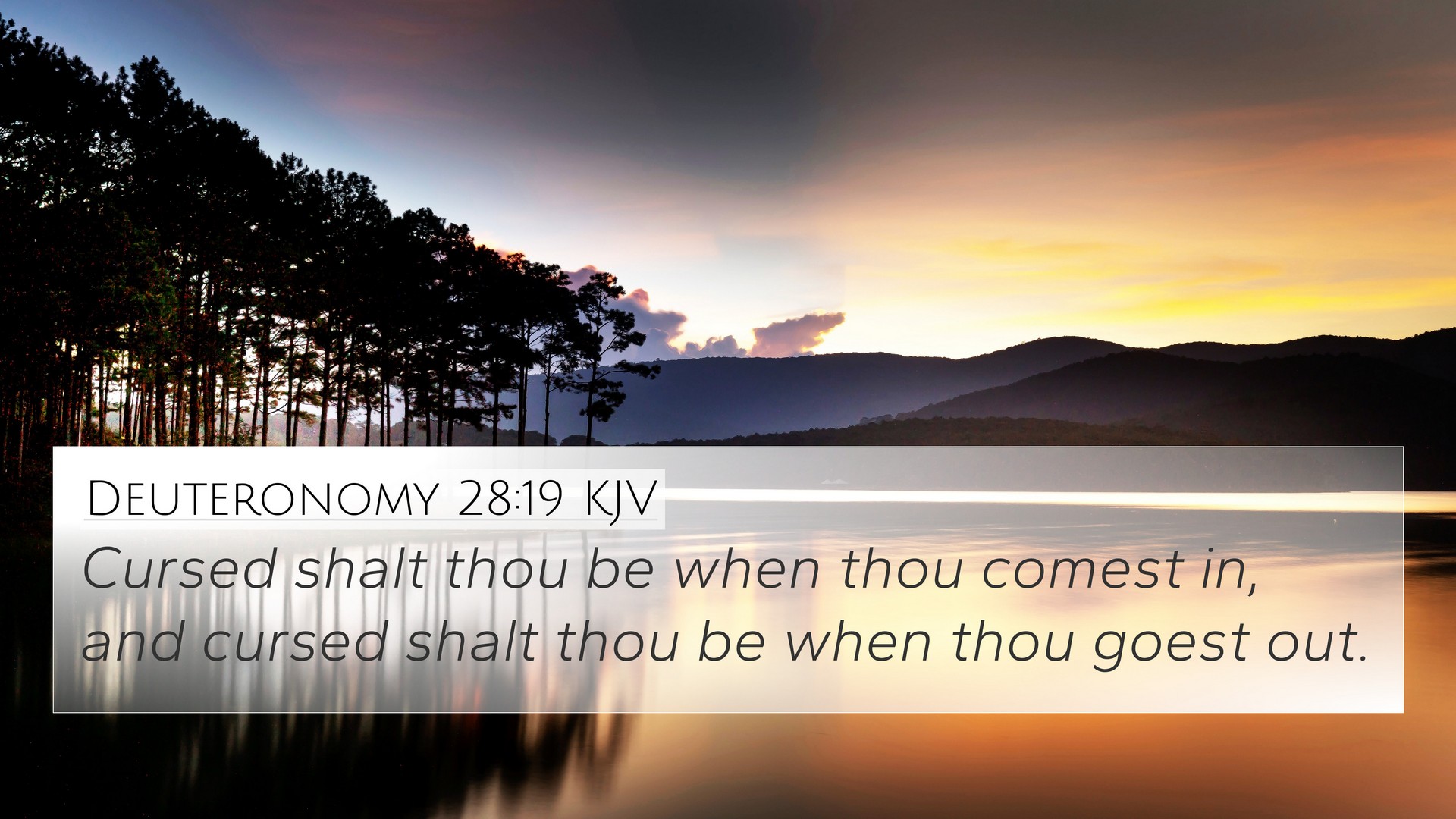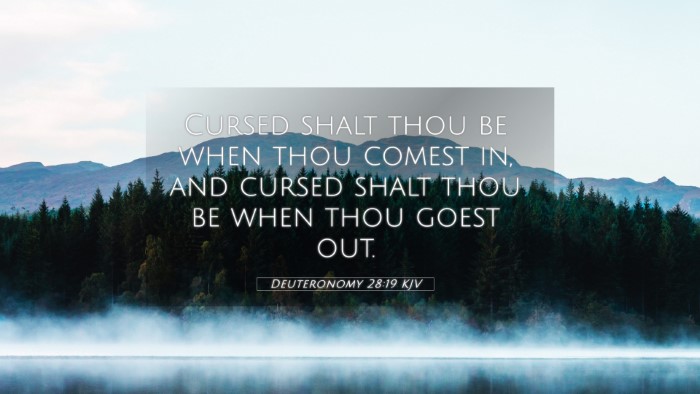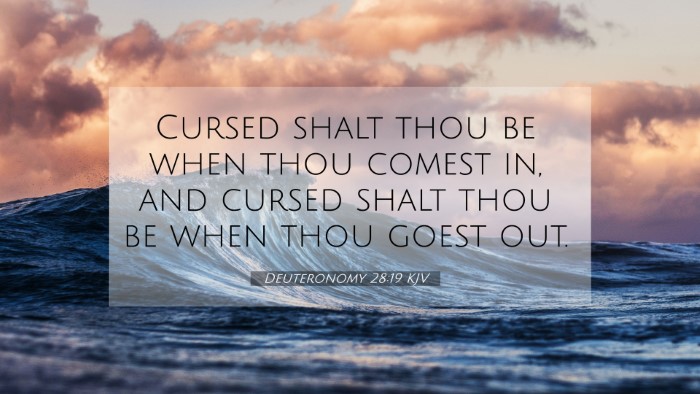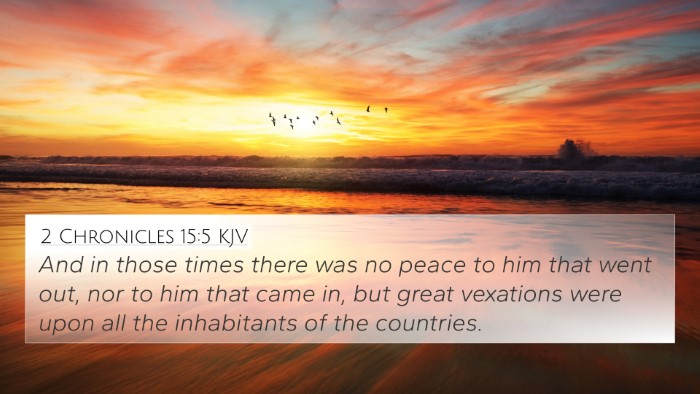Understanding Deuteronomy 28:19
Deuteronomy 28:19 states, "Cursed shall you be when you go out, and cursed shall you be when you come in.” This verse serves as a profound reminder of the consequences that follow disobedience and the failure to adhere to God's commands. The surrounding passages detail the blessings for obedience and the curses for disobedience, shaping a theological framework that highlights the relationship between faithfulness and experience.
Context and Background
This verse is situated within a broader context where Moses addresses the Israelites, outlining the blessings for following God’s law versus the curses that arise from forsaking it. This duality emphasizes the importance of choices made by God's people and the resulting spiritual and physical consequences.
Thematic Insights
-
Consequences of Disobedience:
The verse illustrates that disobedience to God results in curses that permeate all aspects of life, affecting one’s entry and exit, signifying a pervasive and inescapable effect on daily existence.
-
Call to Obedience:
Positioned alongside blessings for obedience, the curses serve as a stark warning that invites a thoughtful response from the faithful. This aligns with biblical principles that communicate God's desire for his people to choose life through obedience (Deuteronomy 30:19).
-
Interconnectedness of Scripture:
This verse activates a dialogue within scripture where the repercussions of Israel's disobedience can be examined in relation to similar themes found in both the Old and New Testaments, showcasing a rich foundation for thematic exploration.
Commentary Insights
Matthew Henry
Matthew Henry underscores that the curses indicate the absence of God's favor, which directly correlates with an individual’s rebellion against divine ordinances. He emphasizes that when God’s people stray, His judgment follows, affecting not just the spiritual realm but manifesting in all facets of life.
Albert Barnes
Albert Barnes indicates that the use of “cursed” emphasizes the severity of divine retribution and signifies spiritual unrest. He interprets this expression of curse as encompassing all forms of failures, ranging from moral deficiencies to spiritual transgressions, thus creating a holistic view of consequence.
Adam Clarke
Adam Clarke notes that this portion of scripture highlights the inevitable nature of curses resulting from disobedience. He elaborates on the Hebrew understanding of entering and exiting cities as a metaphor for life’s journey, where all paths can be marred by deviation from God’s directives.
Bible Verse Cross-References
Deuteronomy 28:19 resonates with several other scriptures that collectively enrich the understanding of blessings and curses, obedience and disobedience, and the overall consequences of human actions in relation to God's will:
- Deuteronomy 30:19 - The choice between life and death.
- Galatians 6:7 - Reaping what one sows in life.
- Psalm 1:1-6 - The contrast between the righteous and the wicked.
- Malachi 2:2 - The consequences of turning away from God’s commands.
- James 1:15 - Sin's progression leading to death.
- Romans 1:18-32 - The wrath of God revealed against disobedience.
- Jeremiah 17:5-8 - Trusting in man vs. trusting in God.
Conclusion
Deuteronomy 28:19 encapsulates a profound principle of biblical theology: the intrinsic connection between obedience to God's commands and the consequent blessings or curses that unfold in life. Through comparative Bible verse analysis and thematic explorations, this verse serves as an amplified declaration of the importance of living in alignment with divine will, reflecting on how such choices shape the lived realities of believers. The insights from public domain commentaries enrich our understanding and foster deeper engagement with the text, emphasizing both the seriousness of disobedience and the hope that lies in a faithful walk with God.
Tools for Bible Cross-Referencing
Engaging in cross-referencing Bible study can provide valuable insights into scriptures like Deuteronomy 28:19. Utilizing Bible concordances, reference resources, and guides can assist believers in discovering layers of meaning connected to this verse and others.





